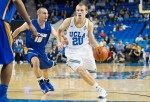UCLA is well aware of who it doesn’t have. Twenty days out from men’s basketball’s opening game against Montana State on Nov. 14, the Bruins are focused on figuring out who they do have.
Of eight rotational players from last year, the five that either graduated or got drafted played an average of more than 26 minutes per game, and with them more than 65 percent of the Bruins’ scoring and rebounding.
But before UCLA determines just who will fill those particular voids, it must first find out who will play a role that won’t show up in any box score: the leader.
“That’s going to be a big key to be honest with you, we came out of retreat and team-building talking about that,” said coach Steve Alford. “I think it’s going to be a really big key, because we’ve got a lot of really good guys, (but) we’ve got to talk more because we’re a very quiet team.”
The reason for a more muted UCLA squad is the departure of now-San Antonio Spur Kyle Anderson, who served as the team’s most vocal leader a year ago.
Guard Norman Powell – the team’s lone returning starter – will likely help fill that role, while Alford also mentioned redshirt freshman guard Isaac Hamilton as someone who could eventually contribute.
A still more likelier candidate to fill Anderson’s role is the sophomore guard who will take his place on the court.
Bryce Alford considers himself ready for it.
“My whole high school career, I was a leader from freshman to senior year really. I’ve always had those leadership qualities, and I think that’s one of my better strengths as a basketball player,” he said. “It’s definitely something that we need and having me and (Powell) at the helm of the leadership role, I think we will be fine.”
One of Bryce Alford’s challenges in stepping into that role will be guiding players that were in the same position he was a year ago. Forward Kevon Looney and center Thomas Welsh are expected to contribute early even though they’re freshmen, while sophomores, guard/forward Noah Allen and forward Wannah Bail – both of whom played sparingly a year ago – will also figure into the rotation.
Looney – a five-star prospect – is expected to help fill in for the tangible aspects of Anderson’s game. Like Anderson, Looney is a tall, long athlete capable of bringing the ball up court. And though Looney doesn’t have the same passing ability as Anderson, Steve Alford praised the Milwaukee native’s rebounding ability and said that he is one of four players, along with Hamilton, Powell and Bryce Alford, whom the coaching staff trusts in running the Bruins’ transition offense.
While the task of replicating the Bruins’ offensive production from a year ago is daunting, particularly for a team this young, UCLA said it believes it can help that endeavor by being better on the defensive end.
“I think a lot of times we were out of position last year and a lot of times we didn’t get defensive rebounds to get into our offensive transition,” Powell said. “I think that’s where our defense this year needs to pick up, by not allowing second chance opportunities.”
Part of the foundation for that belief is the tangible – Welsh and Looney, combined with junior forward/center Tony Parker and freshman forward Gyorgy Goloman, give the Bruins length in the front court that wasn’t there a year ago.
But as it is with replacing five players from a year ago, what’s more important for UCLA at the moment is the intangible.
“Our defense has to get better this year by trusting one another,” Powell said. ” (We can do that) by talking, doing things off the court together, by being open … I think this chemistry is where we want it to be right now.”
